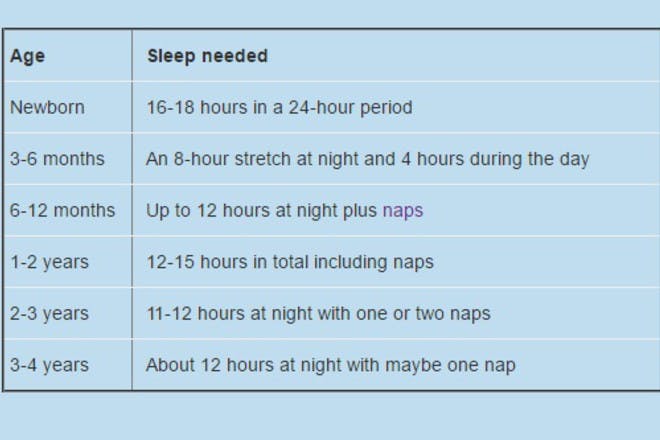When is baby bedtime?

This page contains affiliate links, which means we may earn a small amount of money if a reader clicks through and makes a purchase. All our articles and reviews are written independently by the Netmums editorial team.
As soon as your baby has learnt the difference between night and day, you can start thinking about establishing a set time for her to go to bed.
Yet deciding exactly when that bedtime should be can be tricky.
To help, we spoke to children’s sleep expert Andrea Grace to get her insights on baby bedtimes … including how to tell if you’re putting your baby to bed too early or too late.
Why is baby bedtime important?
All babies love routine, and this includes a consistent time for going to bed.
FREE NEWBORN NAPPIES
By introducing a set bedtime, you can then prepare your baby for sleep with a soothing bedtime routine.
And (hopefully!) that will mean a better night’s sleep for you and your baby.
When should I start putting my baby to bed at a set time?
When your baby is a newborn, her sleep is irregular with no set pattern, says Andrea.
Yet as your baby’s natural circadian rhythms are established and she learns the difference between day and night, she’ll be ready for a set bedtime.

Andrea adds: ‘It takes a few weeks for a baby to get her days and nights sorted out, and at first, your baby will probably go to bed at the same time as you do.
‘In fact, even when she is ready to sleep through the night, her bedtime may still be the same as yours for a few weeks.
‘Gradually though, you will notice that a 7pm or 8pm “nap” extends through the evening and soon becomes your baby’s actual set bedtime.
‘It is better to follow your baby’s lead rather than trying to push an early, set bedtime too soon.’
How do I know when it's time for my baby to go to bed?
Every baby is different, so be led by your little one’s natural sleep cycles, says Andrea.
‘If you keep a simple record of your baby’s sleep, wake and feed times (without getting obsessed) you may soon be able to predict the best napping times and night bed time for her.
‘But do be aware that in the early weeks, your baby’s sleep patterns will change from week to week and sometimes even from day to day.’
According to Andrea, the best way to read if your baby is tired is to look for the following signs:
- Not engaging with you – looking away (this is the first sign)
- Rubbing eyes
- Yawning
- Crying
How much sleep does my baby need?
How much sleep your baby needs changes as she grows. Check out this handy chart from the NHS with suggested sleep times.
So, if your baby is 12-months-old and you want her to sleep until 7am (if only!), you'll need to aim for her to be in bed at 7pm.
Remember every baby is different though, and your baby may need more or less sleep.

Need advice?
Our health visitors and nursery nurses are online Monday to Friday evenings to answer your queries on feeding, sleep and child health.
Is my baby’s bedtime too late?
It’s very hard to settle an overtired baby. So the key is to put her to bed before she gets to this stage.
Andrea says: ‘When babies and children get very tired, they can become “wired” rather than sleepy. Rocking and over handling them can sometimes make things worse.’
To avoid this, look out for the cues above that your baby is tired.
And Andrea recommends starting your bedtime routine around 30-40 minutes before this.
How will I know if my baby’s bedtime is too early?
It’s all about the timing!
Andrea says: ‘At about six to eight weeks, when your baby typically starts to do her first longer sleep stretch, you really want this stretch to be from later than 10pm or so.
‘Putting your baby to bed too early can mean she is then up for a long period during the night.’
Also, be mindful of your baby’s changing needs when it comes to daytime naps … especially the timing of her last afternoon nap of the day.
Andrea says: ‘With an older baby, you may notice that as the day progresses, her need to sleep stretches out a bit.
'So while she may only last an hour or two hours after waking from the night until the first nap, she may need three hours or so after waking from the final nap before she is ready to settle for the night.’
Why doesn't my baby want to go to sleep at bedtime?
There are so many reasons why a baby might not want to go to sleep at bedtime, says Andrea. Along with bedtime being too early or too late, it could also be:
- The build-up of “sleep pressure” – which is needed in order to fall asleep – being broken by your baby dozing on the bedtime milk feed.
- Your baby not having the ability to self settle yet, and wanting instead to be in your arms or nursing.
Andrea adds: ‘If you can identify the reason why your baby might be struggling to go to sleep, then you’re in a good position to help her.’
How can I create the right environment for my baby to go to bed?
There are lots of factors that will encourage your baby to go to sleep. These include:
- The right lighting
- The right room temperature
- Nightclothes that fit correctly
- The right amount of bedding, depending on the temperature
It’s also important to keep your baby safe in her cot, Moses basket or bed.
Andrea says: ‘When putting your baby to bed, it goes without saying that her safety is of paramount importance.
'It is strongly advised that all parents follow the Safe to Sleep guidelines set out by baby sleep charity, The Lullaby Trust.
What time do you put your baby to bed? Join the chat in the thread, below ...
Related stories
How much should my baby sleep?
CHAT: Baby wakes for the day at 4am and would choose to go to bed at 4pm
Your baby's sleep: 6 to 16 weeks
Need advice?
Our health visitors and nursery nurses are on line Monday to Friday evenings to answer your queries on feeding, sleep and child health.





